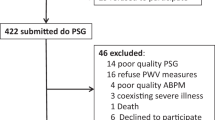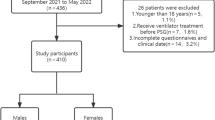Abstract
Obstructive sleep apnoea (OSA) is the main secondary form associated with resistant hypertension (RH), but it is largely underdiagnosed and consequently undertreated in clinical practice. The Berlin questionnaire (BQ) is a useful tool among general population, but seems to not perform well among patients with RH. Recently, NoSAS score was validated in a large population, however, has not been tested in the cardiovascular scenario. Thus, we aimed to compare BQ versus the NoSAS score as screening tools for OSA in RH. In the present study, patients with confirmed diagnosis of RH were invited to perform polysomnography. OSA was diagnosed by an apnoea-hypopnoea index (AHI) ≥15 events/h. BQ and NoSAS were applied in a blinded way. We calculated the sensitivity, specificity, positive predictive value (PPV), negative predictive value (NPV) and area under the curve (AUC) of the two sleep questionnaires to detect OSA in RH. The frequency of OSA was 64%. The BQ presented a better sensitivity (91 vs. 72%) and higher values of NPV (67 vs. 54%) than NoSAS score. In contrast, the NoSAS score had higher specificity for excluding OSA (58 vs. 33%) and higher PPV (75 vs. 70%). Compared to the BQ, NoSAS score had a better AUC (0.55 vs. 0.64) but these values are in the fail to poor accuracy range. In conclusion, both BQ and NoSAS score had low accuracy for detecting OSA in RH. Considering the high frequency of OSA, objective sleep study may be considered in these patients.
This is a preview of subscription content, access via your institution
Access options
Subscribe to this journal
Receive 12 digital issues and online access to articles
$119.00 per year
only $9.92 per issue
Buy this article
- Purchase on Springer Link
- Instant access to full article PDF
Prices may be subject to local taxes which are calculated during checkout


Similar content being viewed by others
References
Calhoun DA, Jones D, Textor S, Goff DC, Murphy TP, Toto RD, et al. American Heart Association Professional Education Committee. Resistant hypertension: diagnosis, evaluation, and treatment: a scientific statement from the American Heart Association Professional Education Committee of the Council for High Blood Pressure Research. Circulation. 2008;117:e510–26.
Daugherty SL, Powers JD, Magid DJ, Tavel HM, Masoudi FA, Margolis KL, et al. Incidence and prognosis of resistant hypertension in hypertensive patients. Circulation. 2012;125:1635–42.
Pedrosa RP, Drager LF, Gonzaga CC, Sousa MG, de Paula LK, Amaro AC, et al. Obstructive sleep apnea: the most common secondary cause of hypertension associated with resistant hypertension. Hypertension. 2011;58:811–7.
Logan AG, Perlikowski SM, Mente A, Tisler A, Tkacova R, Niroumand M, et al. High prevalence of unrecognized sleep apnoea in drug-resistant hypertension. J Hypertens. 2001;19:2271–7.
Muxfeldt ES, Margallo VS, Guimarães GM, Salles GF. Prevalence and associated factors of obstructive sleep apnea in patients with resistant hypertension. Am J Hypertens. 2014;27:1069–78.
Pedrosa RP, Drager LF, de Paula LK, Amaro AC, Bortolotto LA, Lorenzi-Filho G. Effects of OSA treatment on BP in patients with resistant hypertension: a randomized trial. Chest. 2013;144:1487–94.
Liu L, Cao Q, Guo Z, Dai Q. Continuous positive airway pressure in patients with obstructive sleep apnea and resistant hypertension: a meta-analysis of randomized controlled trials. J Clin Hypertens. 2016;18:153–8.
Epstein LJ, Kristo D, Strollo PJ Jr, Friedman N, Malhotra A, Patil SP, et al. Adult obstructive sleep apnea task force of the American Academy of Sleep Medicine. Clinical guideline for the evaluation, management and long-term care of obstructive sleep apnea in adults. J Clin Sleep Med. 2009;5:263–76.
Netzer NC, Stoohs RA, Netzer CM, Clark K, Strohl KP. Using the Berlin Questionnaire to identify patients at risk for the sleep apnea syndrome. Ann Intern Med. 1999;131:485–91.
Margallo VS, Muxfeldt ES, Guimaraes GM, Salles GF. Diagnostic accuracy of the Berlin questionnaire in detecting obstructive sleep apnea in patients with resistant hypertension. J Hypertens. 2014;32:2030–6.
Marti-Soler H, Hirotsu C, Marques-Vidal P, Vollenweider P, Waeber G, Preisig M, et al. The NoSAS score forscreening of sleep-disordered breathing: a derivation and validation study. Lancet Resp Med. 2016;4:742–8.
Drager LF, Bortolotto LA, Lorenzi MC, Figueiredo AC, Krieger EM, Lorenzi-Filho G. Early signs of atherosclerosis in obstructive sleep apnea. Am J Respir Crit Care Med. 2005;172:613–8.
Chowdhuri S, Quan SF, Almeida F, Ayappa I, Batool-Anwar S, Budhiraja R, et al. ATS AdHoc Committee on Mild Obstructive Sleep Apnea. An Official American Thoracic Society Research Statement: Impact of Mild Obstructive Sleep Apnea in Adults. Am J Resp. Crit Care Med. 2016;193:e37–54.
Sert Kuniyoshi FH, Zellmer MR, Calvin AD, Lopez-Jimenez F, Albuquerque FN, van der Walt C, et al. Diagnostic accuracy of the Berlin Questionnaire in detecting sleep-disordered breathing in patients with a recent myocardial infarction. Chest. 2011;140:1192–7.
Tan A, Hong Y, Tan LW, van Dam RM, Cheung YY, Lee CH. Validation of NoSAS score for screening of sleep-disordered breathing in a multiethnic Asian population. Sleep Breath. 2017;21:1033–8.
Dudenbostel T, Siddiqui M, Oparil S, Calhoun DA. Refractory hypertension: a novel phenotype of antihypertensive treatment failure. Hypertension. 2016;67:1085–92.
Costa LE, Uchôa CH, Harmon RR, Bortolotto LA, Lorenzi-Filho G, Drager LF. Potential underdiagnosis of obstructive sleep apnoea in the cardiology outpatient setting. Heart. 2015;101:1288–92.
Acknowledgements
We thank Fundação de Amparo à Pesquisa do Estado de São Paulo and Fundação Zerbini for funding research support. We also thank Altay Alves Lino de Souza for statistical advice.
Funding
FAPESP (Fundação de Amparo à Pesquisa do Estado de São Paulo).
Author information
Authors and Affiliations
Corresponding author
Ethics declarations
Conflict of interest
The authors declare that they have no conflict of interest.
Rights and permissions
About this article
Cite this article
Giampá, S.Q.C., Pedrosa, R.P., Gonzaga, C.C. et al. Performance of NoSAS score versus Berlin questionnaire for screening obstructive sleep apnoea in patients with resistant hypertension. J Hum Hypertens 32, 518–523 (2018). https://doi.org/10.1038/s41371-018-0072-z
Received:
Revised:
Accepted:
Published:
Issue Date:
DOI: https://doi.org/10.1038/s41371-018-0072-z
This article is cited by
-
NoSAS score predicts cardiovascular disease in patients with obstructive sleep apnea
Sleep and Breathing (2023)
-
Rotating shift workers with vitamin D deficiency have a higher risk of obstructive sleep apnea
Sleep and Breathing (2023)
-
Diagnostic accuracy of the Berlin questionnaire and the NoSAS score in detecting risk for obstructive sleep apnea in rotating shift workers
Sleep and Breathing (2022)
-
A meta-analysis of the diagnostic value of NoSAS in patients with sleep apnea syndrome
Sleep and Breathing (2022)
-
Diagnostic accuracy of screening questionnaires for obstructive sleep apnoea in adults in different clinical cohorts: a systematic review and meta-analysis
Sleep and Breathing (2022)



